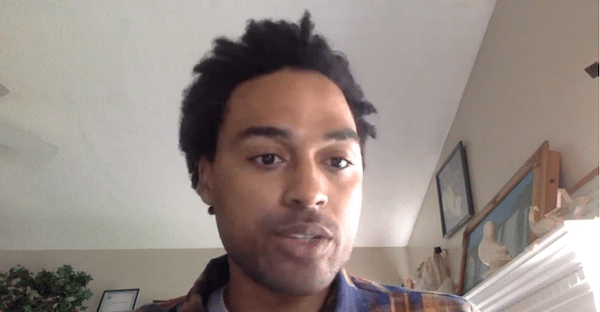Janine Jackson interviewed Black Alliance for Peace’s Chris Bernadel about Haiti for the April 12, 2024, episode of CounterSpin. This is a lightly edited transcript.
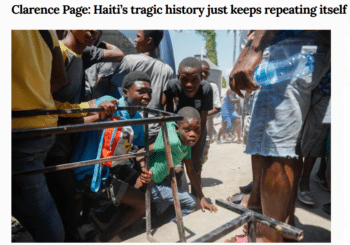
Chicago Tribune (3/27/24)
Janine Jackson: Columnist Clarence Page reflects U.S. liberal media’s understanding of Haiti with a piece headlined “Haiti’s Tragic History Just Keeps Repeating Itself.” “The Biden administration,” Page writes, “shows little appetite to become deeply immersed in perennially troubled Haiti.” And “it’s no secret that many Americans have grown weary of trying to solve too many of the world’s problems.”
The Hill notes that more than 5 million Haitians, out of a population of 11 million, are at stage three and four levels of hunger—the fifth stage being famine. The U.S., described as “one of the largest donors for Haiti,” is reporting difficulties in delivering aid, but bravely plans “no change in strategy to address the crisis.”
A piece in the Plain Dealer suggests why we should care: Haiti’s “economic, social and environmental meltdown” is “sure to reach our shores.”
So, yes, you can learn something about Haiti’s current crisis, and the U.S. view of it, from the news media. What you won’t learn about are the roots of the crisis, much less how they can be traced back to the U.S.
Chris Bernadel works with the Black Alliance for Peace Haiti/Americas Team and the Haitian grassroots organization MOLEGHAF. He joins us now by phone. Welcome back to CounterSpin, Chris Bernadel.
Chris Bernadel: Thank you for having me; I’m glad to be here.
JJ: The first, if not the only, thing that many U.S. citizens will take away from media coverage about Haiti today is that “gang violence” is terrorizing the capital, Port-au-Prince. But when Americans think about gangs, their image is generally of poor, young, probably urban people, disaffected, unemployed, who are just grabbing whatever weapons they can and sticking up people on the street for money and for kicks. But that doesn’t really properly convey who the gangs right now in Haiti are, or where they come from, does it?
CB: No, not at all. And in the history of Haiti, there have been a number of times when armed groups have been involved in the political situation. These armed groups, or paramilitaries, as I like to call them, are funded by the ruling elite of Haitian society, the ruling elite that controls the ports, families like the Bigio family, and they’re made up of many of the young men from the poorest areas of the Haitian capital and other parts of Haiti. But many of the members and leadership of these groups are former police, former military; some of them have military training. So to call them gangs is a mistake. And I would say the proper characterization is paramilitary groups, armed groups, and they’re carrying out the interests of the ruling Haitian financial elite who have controlled Haiti’s economy for a long time.
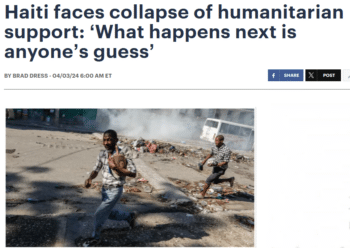
The Hill (4/3/24)
JJ: Haiti doesn’t manufacture guns, right? So the guns are coming from somewhere else.
CB: Exactly. The guns are coming from the United States. Most are coming through Miami, through these privately owned ports, or ports that are owned by these wealthy families, and they’re being disseminated around the poor neighborhoods in order to try to carry out the political objectives of different sections of Haiti’s ruling elite. So they’ll arm one group to attack another group, and they’ll have groups protect certain areas and not go into other areas. But these armed paramilitary groups, for the most part, are carrying out the interests of the ruling elite.
JJ: Let’s talk about the so-called political landscape. The Caribbean Community and Common Market, CARICOM, has put forth a proposal for a transitional government that The Hill, just for one example, says “will be key to efforts to put Haiti on the path to restore security and wrestle control back from the gangs.”
You’ve already complicated the “gangs” part of that, but what is the response of Haiti advocates to this CARICOM proposal, both what it says and the way it came about?
CB: This CARICOM proposal is a new face for the same process, the same kind of thing that’s been going on. The main issue with Haiti, the main problem in Haiti, are not these armed groups, not these paramilitaries, as is being portrayed. The main problem continues to be what it’s been, specifically, since the 2004 coup d’etat against Jean-Bertrand Aristide.
So the main problem in Haiti is the international community, the so-called Core Group, U.S. foreign policy implementing their will in Haiti, and not allowing for Haitian society to develop a government and a civil society that serves their interest and their needs. The constant interventions, starting with the MINUSTAH intervention in 2004 that lasted into 2017, which pretty much laid the ground for the crisis we have in Haiti today. That situation removed all of what was left of a legitimate Haitian government. We went from a period where we had around 7,000 elected officials to today, where we have zero elected officials in power.
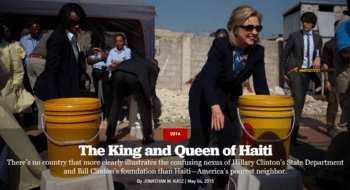
Politico (5/4/15)
We’ve gone from one version of the PHTK to another to another, first one being delivered to us by Hillary Clinton, when she flew into Haiti to ensure that Michel Martelly would be able to pursue the presidency, and then followed by Jovenel Moïse, and then with Ariel Henry. And now that they’ve forced Ariel Henry to step down, in order to implement this transitional council, we’re seeing more of the same. These are the same political actors, the same political class that the Haitian people have shown time and time again they do not trust, and they see them as foreign actors, people acting on the behalf of foreign interests.
JJ: I know that a lot of listeners don’t know the deep history of U.S. intervention in Haiti, and international intervention in Haiti. I would ask them to look back to 1791 and George Washington’s promise to help the French quell “the alarming insurrection of the Negroes.” Or they can look up the 1915-to-1934 occupation, or right up to the 2015 Politico headline calling Bill and Hillary Clinton “The King and Queen of Haiti.”
But it is, of course, as you’re saying, the 2004 coup—the role of that can’t be overstated. And I guess what I want to say is, if you have an illegitimate result, an illegal action, and then that leads to other illegal actions, it doesn’t get cleansed along the way because the facts on the ground change. There is no way to understand Haiti’s present without understanding its history.
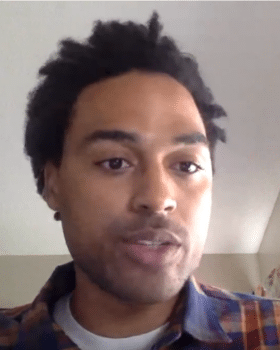
Chris Bernadel: “The problem in Haiti is…the way that the economy has been artificially propped up to support foreign enterprises.” (image: The Narrative)
CB: Exactly. And the problem in Haiti is the socioeconomic problem, as far as the structure of Haiti’s economy, the way that the economy has been artificially propped up to support foreign enterprises and carry out the interest of the Core Group, primarily France, Canada, the United States. And also, the United States, using the 2019 Global Fragility Act, has plans to carry out further intervention in Haiti, and to further diminish the sovereignty of the Haitian people, by implementing more unelected governments, putting people into position without any legitimacy, without any constitutional reasoning, without any constitutional legality, they’re putting these people into office.
And what’s even more outrageous, now that the CARICOM community is acting in the same way that the Core Group has been acting in Haiti, they placed a requirement on all members of this so-called transitional council, where they must accept foreign military intervention in order to be a part of this council.
So this council is a U.S. idea, and is being dictated by the United States and the State Department, as well as CARICOM, and it’s not in the interest of the Haitian people. The Haitian people have already rejected many of these actors that are taking seats on this council. A requirement to be in this Transitional Council, who will be selecting the next leader, the de facto leader of Haiti, is to accept this foreign military occupation, this occupation that the U.S. has been trying to arrange, that has been characterized by some as a “UN intervention,” but it is not a UN intervention.
The UN won’t be sending in anyone. The U.S. got the Security Council to rubber stamp this Kenyan police force that they’re funding to come into the country.
And so with the disaster that was the MINUSTAH occupation of 2004 to 2017, where they unleashed cholera into the country and killed over 10,000 people, as many as 30,000 people, killed by cholera released into the country by UN peacekeepers, so-called.
Now the U.S., for this intervention that they’re planning, it won’t even be a UN force officially. So whatever accountability that came along with a UN force being sent to the country, now that won’t even be there.
They were attempting to get a Kenyan force brought into the country, and they’ve faced some roadblocks with that, political and logistical, I’m sure. And now they are propping up this council to cover up for what they were trying to do under Ariel Henry, which they now see wasn’t possible. They’re trying to do the same thing now under this council that they’re controlling.
JJ: With the Global Fragility Act, supposedly it’s about countries that are “prone to instability” or something—I don’t know what the language says—without any understanding of what it is that is introducing instability to these places. And this is a new face. But what I hear you saying is, it’s a new face on an old story. Really, it’s the same thing.
CB: Exactly right. So-called fragile states, countries prone to instability, conflict and poverty, are being framed as threats to U.S. security. And the Global Fragility Act is a means for them to more easily send out their resources and institutions from the Defense Department, the State Department, USAID and the Treasury, so-called international allies and partners, to deal with these situations.
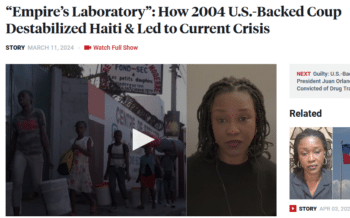
Democracy Now! (3/11/24)
So this is just a new form of what they did in 1915, when they invaded the country and had to come up with excuses and reasons to cover up their real motivations. Same thing in 2004, when they did the coup d’etat against Aristide. And now again, we’re seeing the same type of intervention into Haitian politics, Haitian society, where the Haitian people, the masses of Haitian people, who for years have been coming out into the streets demanding a transition to a democratic government that represents their interest, the United States and their allies are doing the same thing they’ve been doing this whole time, implementing a foreign force, implementing foreign control over Haitian government and policy. And the results won’t be any different.
Now what we’re seeing with the so-called gangs, what we call armed groups and paramilitaries, are another way to find a reason to intervene into the country. But it’s not just as simple as that, because the dynamics of Haitian society, where you have a tiny ruling class propped up by this international community, but that really runs things from the shadows, and plays the role of doing the dirty business for the U.S., for the imperialist powers of the world, to control and dominate Haitian society. They have, in the past and today, found it convenient to fund armed groups, desperate young men in poor neighborhoods, but also, like I mentioned earlier, people who come from the military or the former military, people who come from the police, to enact their interest and will in this situation.
JJ: I think folks are going to read media, and they’re going to hear talk about the transitional committee and government, and all of these machinations, as being about supporting Haitian sovereignty. And “sovereignty” is thrown around with reference to officials who have been essentially appointed or installed by the U.S. and international powers. And so every time we talk about “sovereignty” in Haiti, we’re kind of reifying this fiction of what’s going on, yeah? It’s deeply misleading.
CB: Yes, that’s exactly right. They did this with Ariel Henry, where they propped up Ariel Henry for months and months and months, even though the people of Haiti were demonstrating in the streets, coming out against every policy that he ever put out, coming out against the de facto ruler that was imposed on them that had no constitutional authority. And when they reached the end of that rope, when they saw that the situation had gone too far, and the armed groups had taken the step to actually keep Henry from reentering the country, they now have transitioned to a new strategy with this presidential council, or this transitional council, which will be more of the same.
JJ: Let me ask you, finally, what do real ways forward look like, and what must they include?
CB: Real ways forward must include the Haitian people being able to take control of this transition process. After the assassination of Jovenel Moïse, and even before that, like we spoke about before with the coup d’etat against Jean-Bertrand Aristide, the Haitian government, the Haitian state, has been pretty much destroyed by foreign powers. And the Haitian people have the right to go through their own process, their own domestic process, to develop a solution.
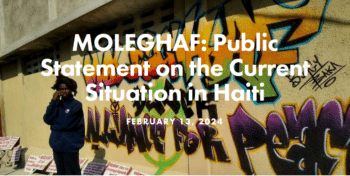
Black Alliance for Peace (2/24/24)
There are Haitian political organizations, like MOLEGHAF, who are on the ground, working with workers, students, people in the neighborhoods affected by some of this violence. There are other organizations throughout the country.
And another thing, as well: Haiti is not just Port-au-Prince. There are many other regions where the security situation is not the same, but the political and economic situation, due to the situation in the capital Port-au-Prince, is deteriorating. But not the entire country is in the same situation as Port-au-Prince.
But the Haitian people have the will and the right to work through their own process, to come up with a transition to get back to a constitutional government and a sovereign democratic state, where they can make decisions for themselves.
So it’s up to us, allies of the Haitian people, to call out the U.S., to see through their different tactics, like what they want to do with the Global Fragility Act, what they’ve been doing with this transitional council, their plans to bring Kenyan troops into Haiti as a blackface cover for U.S. imperialism. We have to call them out. We have to hold them accountable, and we also have to support organizations in Haiti like MOLEGHAF. And we have to support the Haitian people in general, to allow them the space to develop a transition, to develop a solution to these problems. And they can do it.
The United States, the foreign powers, the Core Group will continue to intervene and try to control the process. But as we’ve seen, things have gotten out of hand; they can’t predict what’s going to happen next and they can’t control the situation. So they’re trying to look for new versions of the same solution they’ve always proposed to the situation, which is them dominating.
So now the Haitian people have an opportunity to develop their own processes, their own solutions, and it’s going to be up to them. All we can do is keep the U.S. government out of it and try our best to keep the U.S. government from overthrowing whatever democratic, sovereign form of Haitian government that can come out of that process.
JJ: All right, then. We’ve been speaking with Chris Bernadel from the Black Alliance for Peace Haiti/Americas Team, as well as MOLEGHAF, a Haitian grassroots organization. You can find information about what we’re talking about online at BlackAllianceForPeace.com. Chris Bernadel, thank you so much for joining us this week on CounterSpin.
CB: You’re welcome.

